Annie's Story
Recently our wyandotte hen Annie passed away. It's been a while since I told the story of any of our hens and I'd like to share some photos of her for prosperity, because she certainly had a place in our hearts.
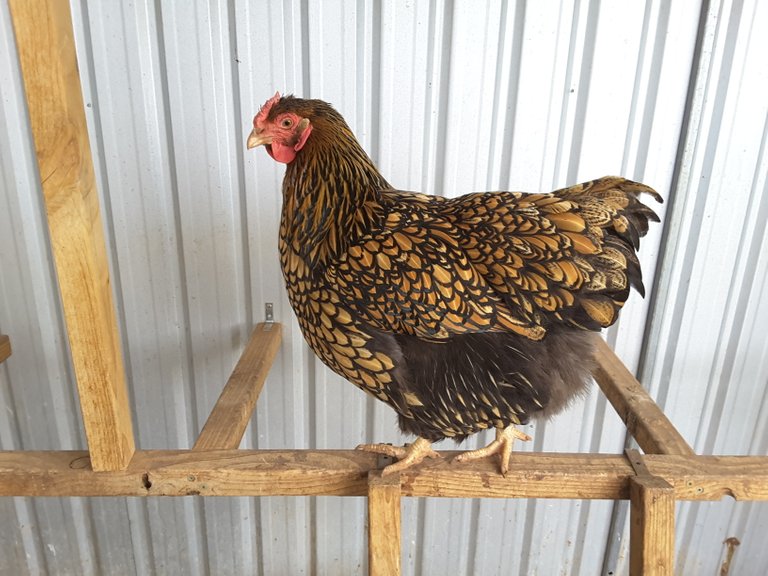
I never planned on getting wyandotte chickens, because we live in a very hot climate and they aren't really built for it. They are a relatively heavy breed and have small, rose combs, which don't allow for heat dispersal as well as a large comb would. We’d actually planned to get barnevelders, but the lady we were getting the hatching eggs from informed us last minute that most of her hens had gone broody and she wouldn't be able to make up the two dozen eggs we were after. She offered to make them up with a mixture of eggs from her other breeds and I was eager to get some eggs hatching, so I agreed. The gold laced wyandottes were just so beautiful, I couldn't resist letting her add some eggs, after asking how they managed the hot days.
It was nearly a four hour round trip to fetch these eggs, but I appreciated how the birds were being kept after seeing some nasty conditions with some of the local breeders. Unfortunately, her good chicken ranging practices didn't account for the fact that her breeding choices were a little questionable, as we soon discovered some inbreeding issues which lead to a bad hatch rate and some early deaths in the barnevelders. Thankfully it was just within the barnevelders, but disappointing as these were the majority of the eggs.
Of the wyandottes there was a 100% hatch rate, but just one female out of them. We named her Anne the wyANNdotte, which in true Australian fashion became Annie. Annie got a lot of attention growing up, not just because of her beautiful colouring and the fact she was the only female wyandotte, but because she got sick. It turned out to be worms, but we still don't know why it affected her much more than the rest of them. Once the flock was treated she made a full recovery and grew into a big, beautiful lady.
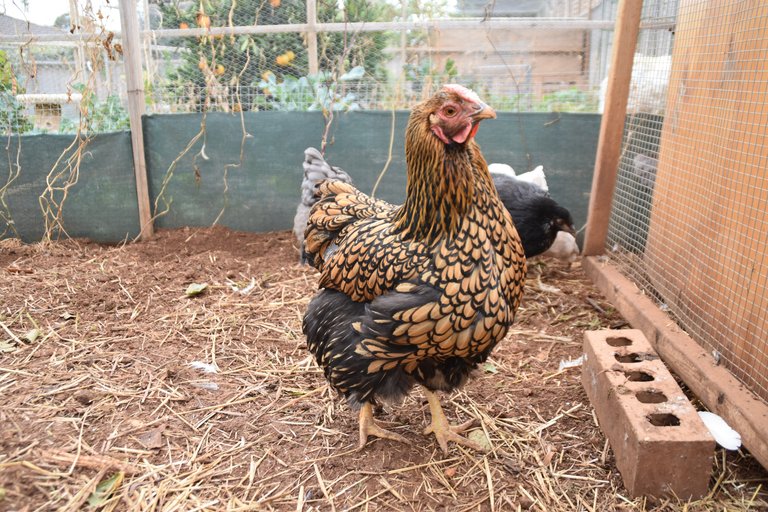
While Annie tolerated handling, she much preferred to hop on your shoulder or back, especially if you crouched down in the run. Many a jacket ended up with her muddy footprints on it, over the years. She was also such a mothering kind of hen, that if you felt a light pecking or tugging on your clothes, it was most likely her preening you.
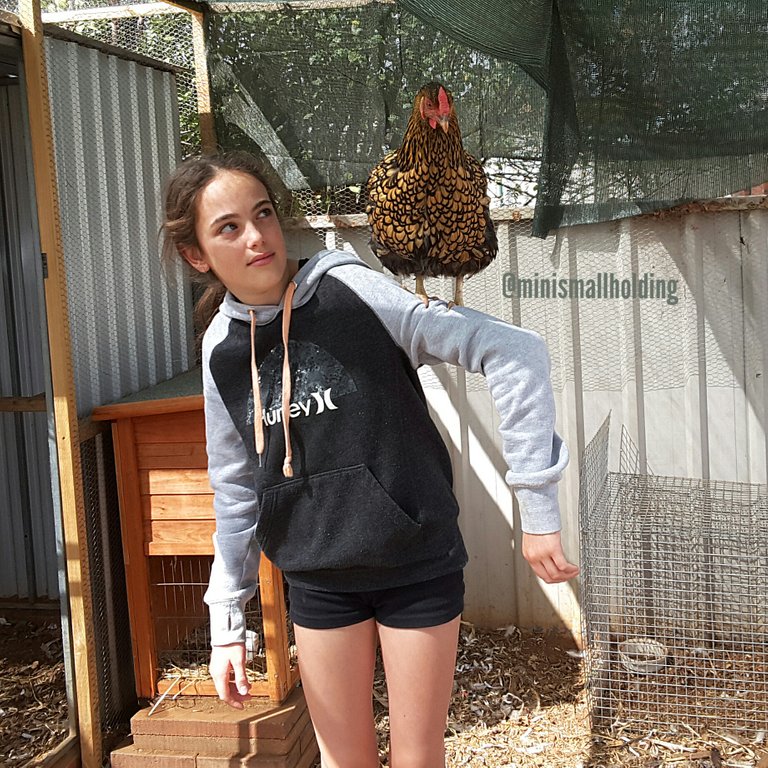
I seem to have lost the original of this photo and had to retrieve the watermarked from Instagram. 😕
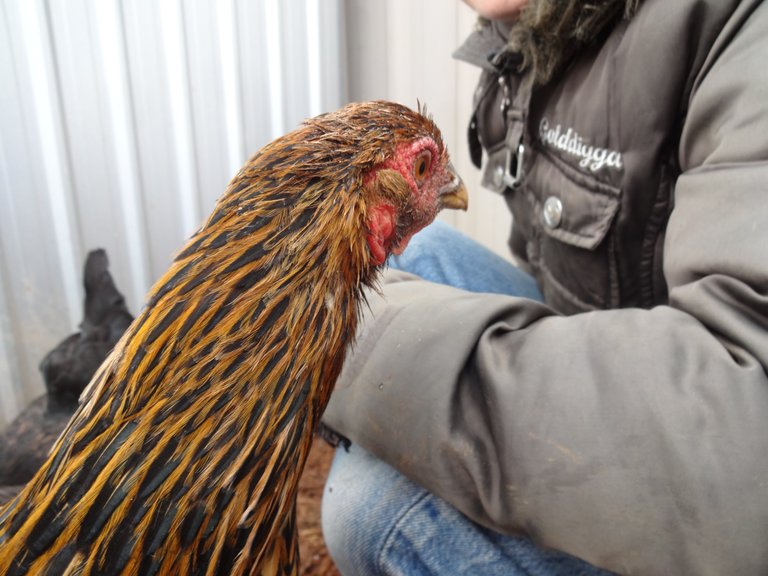
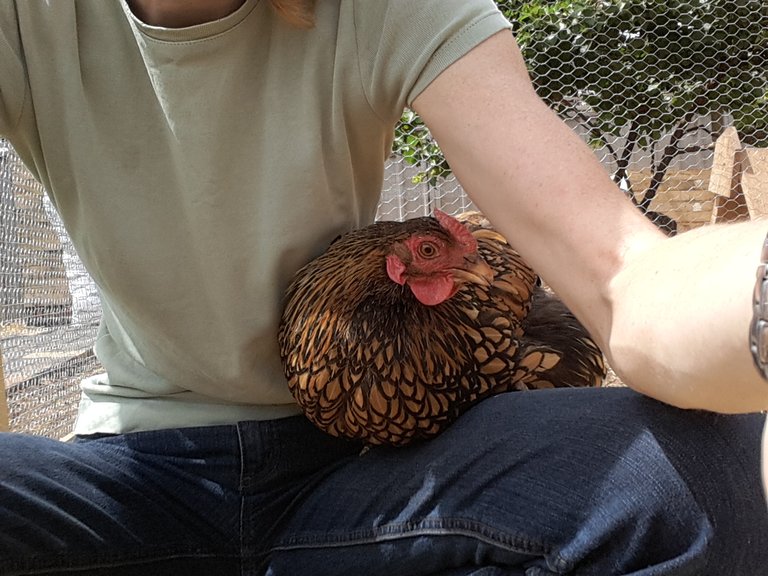
She was what I called a walking broody. For those who may not know, when a hen goes broody, she will stop laying eggs and sit on them instead. The broody hen will wander around for a few days before sitting making a distinctive clucking which is immediately recognisable as that broody cluck and I'm sure it's where the term “feeling clucky” comes from. They will also puff themselves up and when they come off the nest for breaks during sitting you'll know about it with that feathery, clucking fluff ball who'll likely also scream at a few other hens while she eats, drinks, dustbathes and does the biggest chicken poop you've every seen, before going back to the nest!
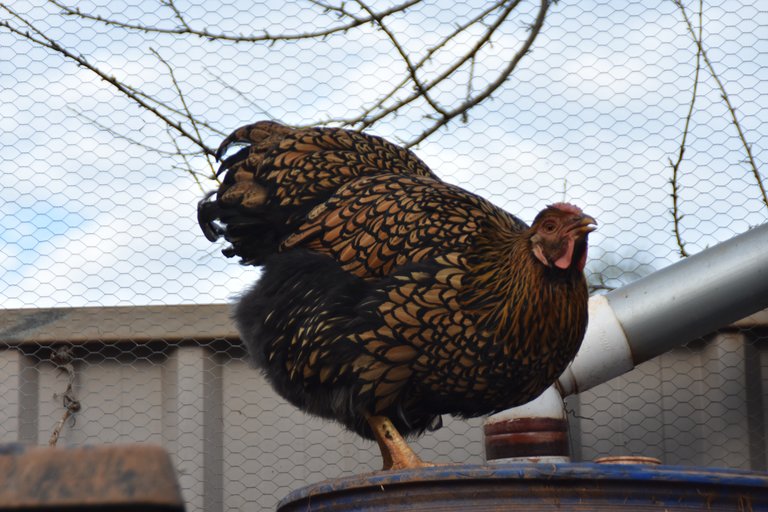
That broody pose!
This cycle can usually be broken by confining them to an area without nesting materials until their hormones settle back down. Once settled, they'll take about two weeks to start laying again.
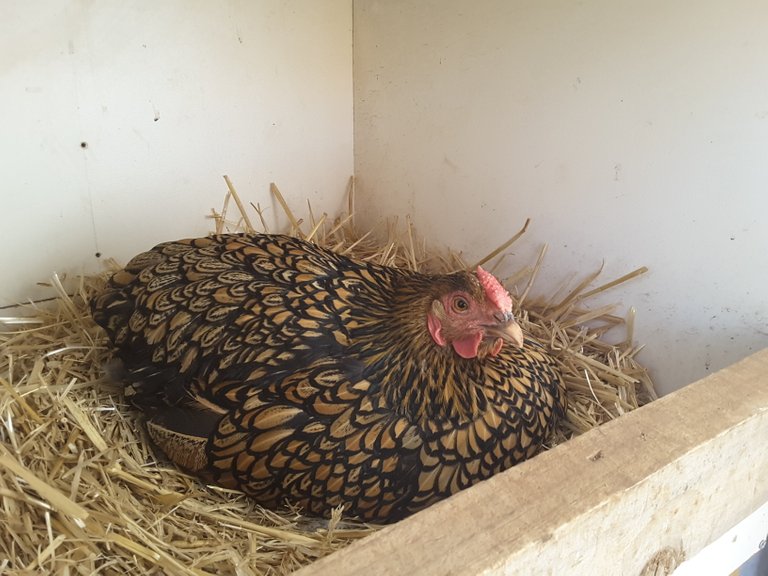
A rare moment on the nest.
Wyandottes are well known as being broody, but Annie was a little different. She’d decide she was broody and would wander around clucky. Then she'd nest for a few days, but come off and wander around clucky again. She wouldn't sit for long enough to hatch any eggs, but she also wouldn't come out of the broody state and instead stayed ‘walking broody’. Confining her without a nest box mattered not one bit, because she didn't need a nest to be broody. For two years we got no eggs from her, but just her longing to be a mamma. Then our bantam, Red (who is now also departed), hatched some eggs and once she came out into the main run with her chicks, Annie moved in to become a second mother. She continued to mother them even after Red was done with them and didn't stop until they were several months old. Then, for the first time in two years she snapped out of being broody and laid eggs for the rest of the season. Naturally, the next season she only laid enough eggs for a clutch and went back to being a walking broody.
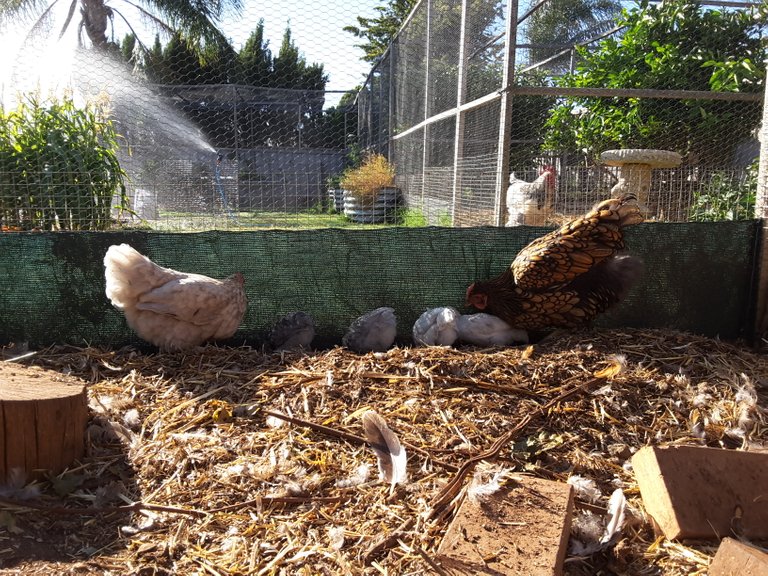
Inserting herself in as a second mamma.
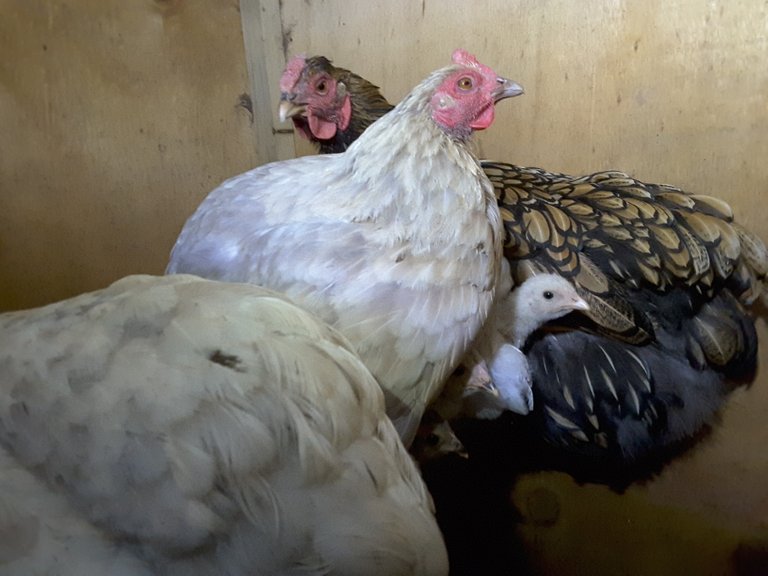
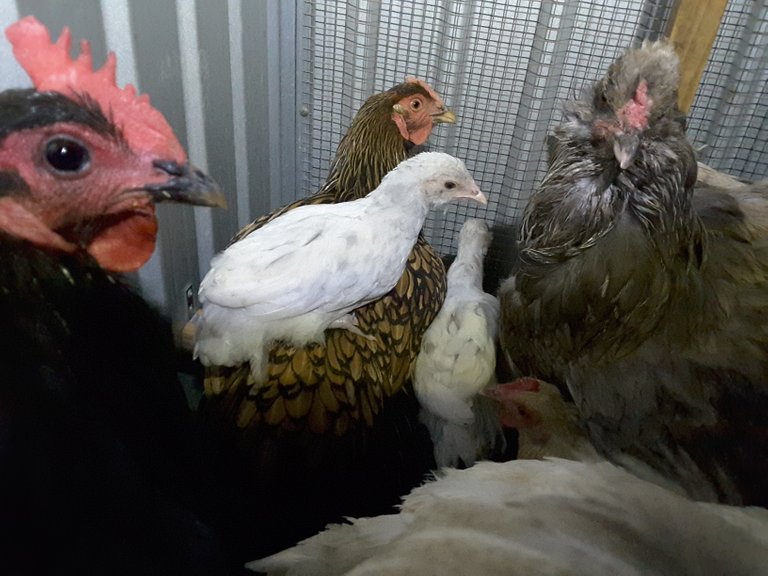
In her element!
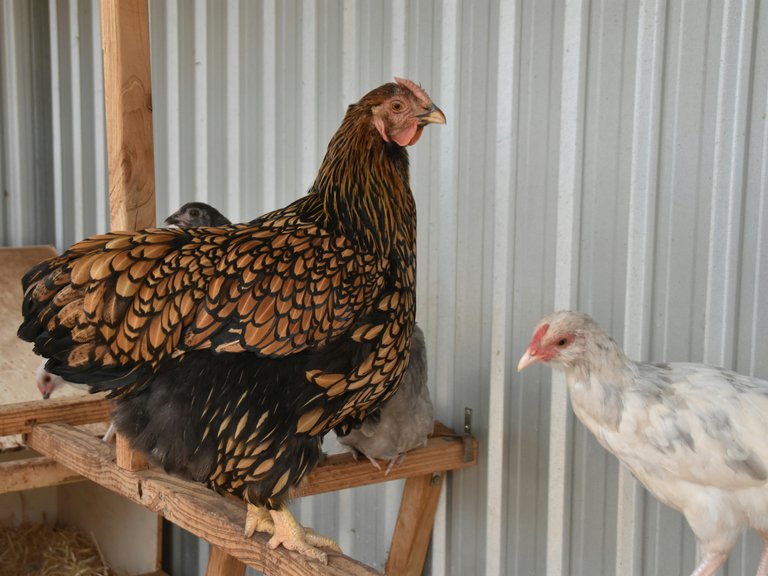
With the teens.
While she wasn't very old, she was certainly slowing down in the days leading up to her death, so I suspected it was coming. I came into the coop one afternoon, to find her peacefully lying in the little dustbathing crater she'd make for herself. She looked like she'd passed on quite peacefully, with the rest of her flock around her.
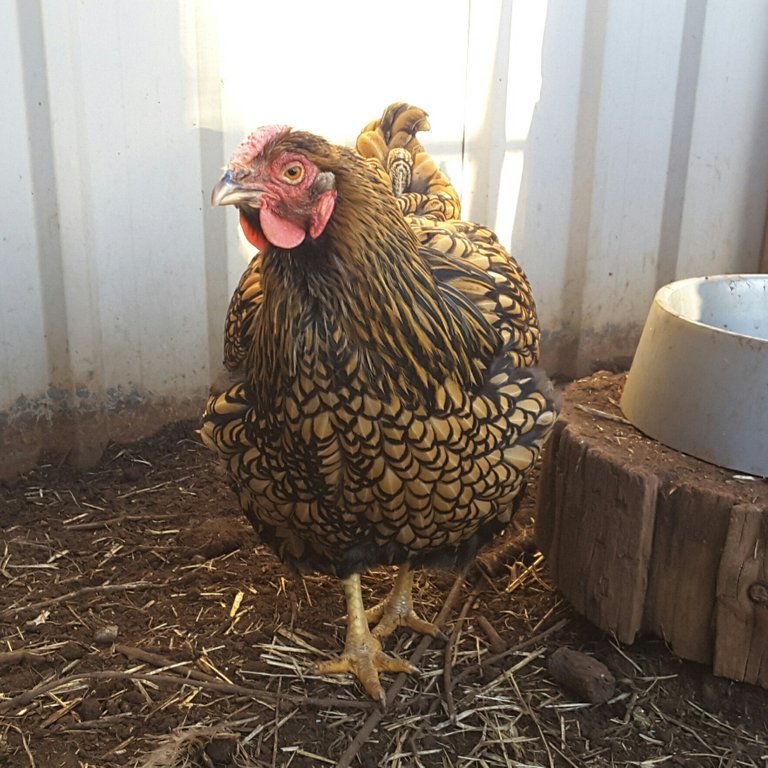
My last photo of her before she left us.
What a lovely story, felt like I was reading about a member of your family and not a hen. How many hens do you have now?
Probably still more than I should have! 😅 It's double figures still, so I'm trying to avoid replacing too often. Chicken maths is a real issue!!
!ENGAGE 15
Hahah it sure is!!
I have 4 or 5, maybe 16..
Ah yes, always stick to the originally planned numbers, even if you don't...
ENGAGEtokens.Sleep well Annie, you had a great life with the MSH family!
I certainly hope she did.
!ENGAGE 10
ENGAGEtoday.How beautiful and wonderful was Annie ! And what a sweet story and great tribute with lovely shots you have made here ! 😊❤️
Thank you. She was pretty special.
!ENGAGE 10
ENGAGEtoday.Oh wow, I did not know this about chickens and always wondered where the term derived from. It does sound like it comes from chickens and it's always where my mind goes when someone says "I'm feeling clucky" which is quite often to me as I have young children (baby and a 3 yr old)
Sorry for your loss
I didn't realise you had a baby too. I can imagine you'd get the broodies flocking in! I suddenly realise we also use the term 'getting broody'. 😆
!ENGAGE 20
ENGAGEtoday.So sorry for your loss. Annie was so beautiful and quite special.
I learned so much by reading this wonderful homage. I have never ever researched or studied the behaviors of chickens and was really amazed about her motherly desires and instincts. It was rather touching to read.
You have some beautiful photos and memories of her. I can see she was loved very much by your family ~
💚
They are quite characterful and similar to us in some ways. Depending on the breed, they don't always go broody. I have a few who never do and some who out occasionally do. Red actually surprised me when she hatched a clutch, because those particular bantams don't usually go broody, so I wasn't sure if she'd make an attentive mother. Our top hen hatched an egg once, then didn't know that the chick was what she'd hatched. She didn't like it eating her food! 🤣
!ENGAGE 25
Wow they are really interesting and intriguing animals to learn about. Thanks for sharing the knowledge!
Haha oh goodness she didn't like sharing her food!! So funny! 😂
Thanks for the engage ~
ENGAGEtoday.I am so sorry to hear about Annie, animals really bring so much to our lives and it is wonderful getting to see their characters grow. Thank you for sharing her story with us and for celebrating her in this way.
Curated for #naturalmedicine by @trucklife-family .
Earn Instantly For Writing Natural Health Content
Earn LOTUS and HIVE rewards for sharing your natural health content on www.naturalmedicine.io. If you don't already have a HIVE account, you can sign up for
FREEhere. We support writers sharing about herbalism, TCM, yoga, meditation, vegan and other healthy diets, as well as earth centred practices such as foraging, permaculture and biodynamics - read more about us on our Welcome Page!DelegateIICommunityIIDiscord
Thank you @trucklife-family. I wish she could have stayed with us a bit longer, but I'm happy her passing was peaceful, which it may not have been had she hung around.
She sounds like a right character, though useless haha. It doesn't matter though does it - you can't help but love them. In more desperate times I'm sure she'd have been chicken dinner since she couldn't pull her egg producing weight.
I'm finding my wyandotte babies quite like perching high on things. I hope they handle the heat where they are under the elders. I must take some photos today so you can tell which one are the roosters...They are so good looking, these birds!
One of my Australorps is broody at the moment.
I would really love to get Barvelders next but it would mean getting rid of a few I already have and I'm attached to them all.
She got by on her looks and character! 😆
Youngsters get up everywhere! Once they get their heavier adult bodies, they start to stay lower to the ground, or at least not go quite as high.
My australorps have never been broody. I guess it really must depend on what bedding lines they come from. Even my araucana australorp cross doesn't go broody, which is quite an achievement considering how broody araucanas get.
Barnevelders are lovely. Maybe they can be a consideration for a few years down the line.
Or maybe a separate bring flock hidden at the back of the property...
!ENGAGE 25
Chickens, what chickens? Oh, thossssees.. no, i have no idea where they xame from...
My bloody australorps are nesting in the straw storage above the nesting boxes ..10 feet up!!!!
Lol! They're some fit australorps! I've only ever had my legbar do that, but she's getting a bit old for it now.
ENGAGEtoday.What a beautiful story, I am sorry for your loss. I am currently building a chicken coop for our homestead, I do have one question for you and hope I am not being insensitive.
Did you eat her afterwards, or buried her? From your story she seemed to have died quite suddenly, so I wonder if for that reason she might have contracted a disease and you did not want to take the risk
I also know that people rarely eat spent hens nowadays, as the meat is tougher and there's an emotional attachment.
Thanks in advance!
Thank you.
I don't personally eat my layers when they go, for multiple reasons. First, as you said, it could have been illness that caused the death (although Annie was getting old). Second, after a year old the meat gets incredibly tough, although some people do slaughter older birds and use them for stock. They usually slaughter at 2 or 3 years of age, though. Most don't eat a bird that's died of natural causes, for the first reason. Thirdly, I feel that a hen has already given us plenty of sustenance in the eggs she's provided, so I'd rather let her return to earth.
So yes, pretty much what you surmised. 😊
!ENGAGE 25
Thank you for having taken the time to answer, in Africa a lot of people were eating their hens by cooking them slowly (sometimes in broth or with wine) even after dying of old age, I think it was more a matter of practicality and scarcity of course. As you mentioned, the meat is tough, and I pretty much agreed with everything that you said, it's aligned with my own convictions. I will also like to return to the earth once my river has run its course, it's just logical and beautiful.
I look forward to read more of your content as an homesteader. Much love 🙌
Hmm. I wonder why i didn't get a notification for this reply. 🤔
Yes, sometimes needs outweigh the wants. A long slow cooking process should make sure anything harmful is killed off, at least, in addition making it easier to eat. We had a 3 year old rooster who turned nasty and the meat from him was like chewing leather, but it softened after an hour or two in the pressure cooker.
!ENGAGE 30
ENGAGEtokens.ENGAGEtoday.Your post has been voted as a part of Encouragement program. Keep up the good work!
Try https://ecency.com and Earn Points in every action (being online, posting, commenting, reblog, vote and more).
Boost your earnings, double reward, double fun! 😉
Support Ecency, in our mission:
Ecency: https://ecency.com/proposals/141
Hivesigner: Vote for Proposal
Lovely post! I learned a lot from it, and remember my own golden laced wyandotte, Barbara, fondly. Sounds like your Ann was a good one.
I miss my hens - had to get rid of them because a neighbor reported me and the regulations in my town had changed. I don't miss having to shovel out to the coop in winter, but I do miss their personalities and antics.
I'm sorry you had to get rid of them. 😔
I don't actually mind the poop scooping, because that's mature collection for the garden for me! 😆
!ENGAGE 25
I expect to be moving soon, and just yesterday I collected the poop-enriched straw that was still in my coop to take with me for my next vegetable patch, wherever that may be.
Thanks for the upvote and the Engage!
oh I just realized you misunderstood me. It's shoveling SNOW I didn't care for.
This year I have half the snow shoveling to do because I don't have to shovel out to the chicken coop, in front of the coop doors and gates, and a little patch in their run so they could get some fresh air.
Oh! They didn't like stepping in the snow, then! 😆
ENGAGEtokens.Thank you, @barbara-orenya. It's been a pleasure to post to your welcoming community, even without the extra support. I look forward to contributing again if I find the time.
Congratulations @minismallholding! You have completed the following achievement on the Hive blockchain and have been rewarded with new badge(s) :
You can view your badges on your board and compare yourself to others in the Ranking
If you no longer want to receive notifications, reply to this comment with the word
STOPCheck out the last post from @hivebuzz:
What a beautiful hen and such a lovely post to honor her memory! It's easy to see that she brought a lot of joy!
Thank you. It was nice to pull up her photos and bring back those memories. Its been a while since I did some photography in the chicken run. I should probably do that before I regret not having more pictures.
!ENGAGE 15
Your chicken photos and posts are always welcome at Feathered Friends! ❤️
ENGAGEtokens.